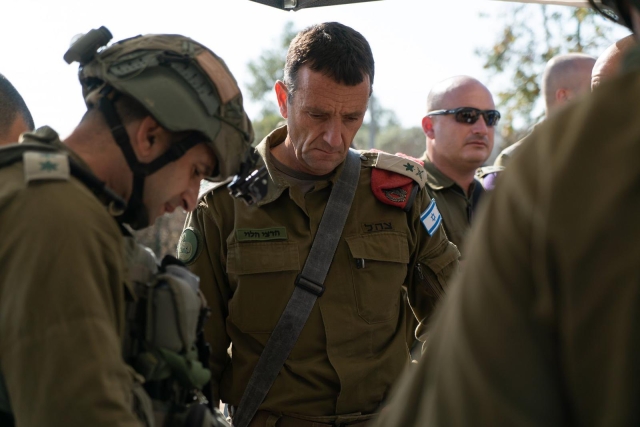Major General Herzi Halevi officially assumed his position as Israel's 23rd Chief of the General Staff of the Israel Defense Forces, replacing Aviv Kochavi who will take off his uniform after 40 years in the IDF. The order of honor began at 10 AM at the Kirya base in Tel Aviv. It was attended by Prime Minister Benjamin Netanyahu, Defense Minister Yoav Galant, and other senior IDF officials. During the ceremony, Netanyahu and Gallant bestowed the incoming Chief of Staff with the rank of 'Rav Aluf', the highest post in the Jewish nation's military, officially releasing Kochavi from his post.
Halevi, a 55 years old father of four lives in an Israeli village just over the “green line” which is a part of the Samaria-based Benjamin Regional Council. He is the first leader of the IDF to live in Judea or Samaria. The Jerusalem-born commander who comes from a religious home, also a first for the nation's top soldier, enlisted at the start of his career to the Nahal brigade, later volunteered for the paratroopers, and went through training as a combat infantry soldier. After serving in several positions he moved to the elite commando unit “Matkal”, where, among other things, he participated as the deputy commander of the unit in the kidnapping of Mustafa Dirani and the failed rescue attempt of Nachshon Waxman. Later he also commanded the unit during the bloody years of the Second Intifada.
Meet the Israel Defense Forces' new Chief of Staff - Herzi Halevi.
— Hananya Naftali (@HananyaNaftali) January 16, 2023
May he succeed in leading with wisdom and strength the army of Israel. 🇮🇱 pic.twitter.com/LLggj3HNVh
On Thursday, the incoming Chief of Staff decided on his first appointment, announcing that Lt. Col. Daniel Hagari will serve as the new IDF spokesman. The appointment was made in coordination with the outgoing Chief of Staff Aviv Kochavi and was approved by Defense Minister Yoav Galant. Hagari will replace IDF spokesman Brigadier General Ran Kochav in the coming months.
Before he took office, his acquaintances discussed him in an article that was published last week in Israel. "Herzi was an exception in the landscape," claimed Yuval Rahmilevich, his former commander. "If I represent to you the majority group in the unit of the 1990s, people who came from the working settlements, seculars, Herzi came from Jerusalem and religious Zionist home. He is very smart and sober and with very high emotional intelligence and he always knew how to integrate and adjust himself without losing his basic identity."
Changing of the Guard: At 10:00 AM, Mjr. Gen. Herzi Halevi will be promoted to the rank of lieutenant general and will officially take over as #IDF Chief of Staff, replacing Lt. Gen. Aviv Kochavi.
— Israel National News - Arutz Sheva (@ArutzSheva_En) January 16, 2023
📸 IDF Spokesperson pic.twitter.com/lOPcdMeWr1
In the political elite as well as in the Israeli security establishment, there is a consensus on the suitability of Herzi Halevi for the position, but former Defense Minister Gantz and perhaps Halevi himself did not take into account what a turbulent political and security situation he would be entering. Halevi will face a series of difficulties on the battlefield and in the political arena in the near future, hopefully without having to command the IDF during a situation of full-blown war.
Israel’s new army chief is a West Bank settler. Maj. Gen. Hertzi Halevi’s appointment caps the decades-long transformation of the settler movement from a small group of religious ideologues to a diverse force at the heart of the Israeli mainstream. https://t.co/UiEByzvKBa
— The Associated Press (@AP) October 24, 2022
Halevi's appointment by Gantz was seen as a sign of the changing times in Israel. Until now, no Chief of the General Staff had lived in Judea or Samaria. The fact the moderate Gantz, who himself was the highest-ranking officer in the IDF, had picked Halevi to succeed Kochavi was seen as a statement that Israel views the disputed areas as an intricate part of the country. Considering the Palestinians have all but abandoned the Oslo agreements they signed and now openly consider all of Israel to be occupied Palestine, the chance of a two-state solution coming into fruition is practically non-existent.


